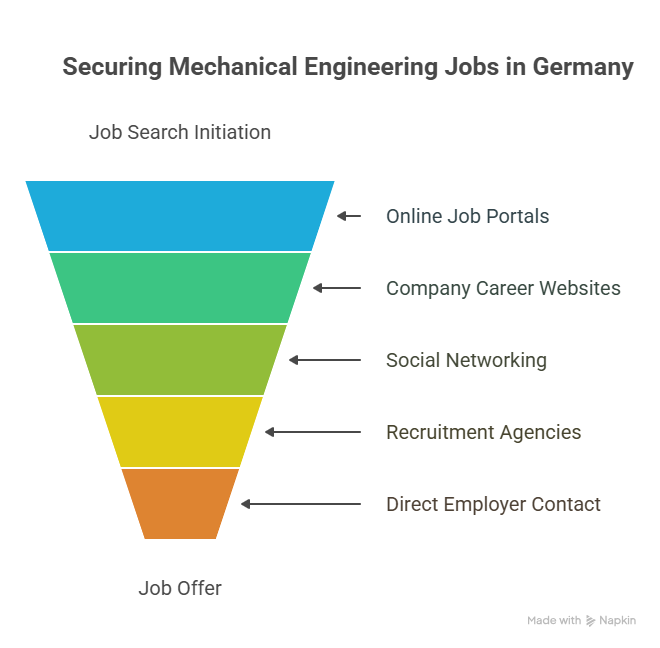Germany’s mechanical engineering jobs market presents exceptional opportunities for professionals worldwide, with the country employing over 1.94 million people in this sector and maintaining 3.3 job openings for every unemployed engineer. This remarkable demand makes mechanical engineering one of the most secure and lucrative career paths in Europe’s largest economy.
Overview of Mechanical Engineering Jobs in Germany in 2025
- Mechanical engineering jobs in Germany form the backbone of the nation’s industrial prowess, spanning diverse sectors such as automotive, aerospace, manufacturing, energy, and emerging technologies. The country’s engineering excellence has earned global recognition, with German mechanical engineering products setting international standards for quality, precision, and innovation.
- Germany’s mechanical engineering industry contributes more than 3% to the nation’s GDP and accounts for 16% of global machinery exports, positioning it as a world leader in engineering solutions. This economic significance translates into abundant career opportunities for both domestic and international professionals seeking mechanical engineering jobs in Germany.
- The industry comprises more than 80,000 firms, ranging from top global corporations to medium-sized businesses, which enables the development of unique careers and fosters professional growth. These companies go out of their way to attract skilled labour, resulting in a vibrant labour market that is open to global talent.
- Modern mechanical engineering jobs in Germany increasingly focus on cutting-edge technologies, including Industry 4.0, automation, robotics, and sustainable energy solutions. The technical transformation has brought about new specialisations and increased the value position of engineers who are ready to evolve and ride along with the industry trends.
Scope and Demand for Mechanical Engineers in Germany in 2025
- The demand for mechanical engineering jobs in Germany remains high, driven by the country’s ongoing industrial transformation and technological advancements. The latest market assessment reveals a historic deficit of qualified engineers, with estimates indicating that Germany will require approximately 3.2 million skilled workers by 2030, primarily in engineering and technical disciplines.
- Such escalating demand arises from a range of significant factors transforming the Firms that are on the hunt for engineers capable of integrating conventional mechanical engineering with cutting-edge digital proficiencies.
- The automotive industry, one of the pillars of the German economy, is rapidly evolving towards battery-powered automation and autonomous vehicles. This shift has created numerous mechanical engineering jobs in Germany focused on electric vehicle development, battery systems, and advanced driver assistance systems.
- The introduction of renewable energy practices has created more career opportunities, with wind energy, solar technology and energy storage systems demanding special skills in mechanical engineering. These emerging markets present significant opportunities for engineers focused on developing sustainable technologies.
- Job opportunities in Germany for a mechanical engineer with a diploma are particularly abundant in manufacturing, plant engineering, and maintenance roles. Holders of technical diplomas often secure excellent entry points into the industry through apprenticeship schemes and targeted training programs.
| Industry Sector | Job Growth Rate | Average Salary Range (€) | Key Skills Required |
| Automotive | 15% annually | 55,000 – 85,000 | Electric mobility, CAD, and automation |
| Aerospace | 12% annually | 60,000 – 95,000 | Materials science, simulation, quality control |
| Manufacturing | 18% annually | 50,000 – 75,000 | Process optimisation, lean manufacturing |
| Renewable Energy | 25% annually | 58,000 – 88,000 | Sustainability, energy systems, and project management |
| Robotics & Automation | 30% annually | 62,000 – 92,000 | Programming, AI, system integration |
Top Companies Hiring Mechanical Engineers in Germany in 2025
Leading corporations consistently seek talented professionals for mechanical engineering jobs in Germany, offering competitive compensation packages and international career opportunities. Such giants of the industry are great platforms for professional growth and technological advancement.
- The Volkswagen Group is Europe’s largest automaker, employing thousands of mechanical engineers across its research, development, and production facilities. The annual wages provided by the company range from €65,000 to €95,000, and additional benefits include stock options and comprehensive medical insurance.
- The BMW Group maintains 18 office locations throughout Germany, offering mechanical engineering jobs with annual compensation ranging from €87,000 to €133,000. The company’s focus on electric mobility and autonomous driving creates exciting opportunities for engineers interested in cutting-edge automotive technology.
- Robert Bosch GmbH has 28 establishments spread throughout Germany and offers some of the best salaries compared to firms within the same industry, with wages ranging from €85,000 to €134,000 per year. Bosch’s diverse portfolio spanning automotive, industrial technology, and consumer goods provides varied career paths for mechanical engineers.
- Siemens AG has 22 German locations where mechanical engineers are employed, and their salaries typically range from 70,000 to 78,000 euros. The company’s involvement in digitalisation, automation, and energy solutions offers excellent opportunities for professional growth.
- The Mercedes-Benz Group offers mechanical engineering jobs in Germany across 21 office locations, with competitive salaries averaging €92,000 per year. The company’s focus on luxury vehicles and advanced technology development creates premium career opportunities.
| Company | Office Locations | Salary Range (€) | Specialization Areas |
| Airbus | 6 | 91,000 – 140,000 | Aerospace, aviation technology |
| Tesla | 2 | 65,000 – 75,000 | Electric vehicles, battery technology |
| Audi | 4 | 62,000 – 98,000 | Premium automotive, autonomous driving |
| BASF | 7 | 77,000 | Chemical engineering, materials |
| Rolls Royce | 5 | 88,000 – 99,000 | Aerospace engines, power systems |
Job opportunities in Germany for diploma-holding mechanical engineers are readily available at various companies, particularly in technical support, manufacturing, and quality assurance roles. Most institutions provide well-organised training programs to catapult the careers of diploma holders.
Latest Salary Insights 2025: What Can You Earn?
- Mechanical engineering jobs in Germany offer highly competitive compensation packages that reflect the country’s strong economy and high demand for skilled professionals. Knowing the salary expectations will enable candidates to make effective career choices and negotiate effectively.
- The salary in the mechanical engineering sector at the entry level is typically between 40,000 and 42,000 Euros per year, which is not bad at all, as it serves as a good foundation for career development. At the beginning of their careers, professionals can earn salaries of 45,000-51,000 euros after 1-4 years of experience, representing an impressive increase in earnings.
- Midway mechanical engineers earn an average annual wage of between € 52,000 and € 57,000, whereas experienced mechanical engineers earn between € 60,000 and € 87,000 per year. These figures illustrate the substantial financial benefits associated with career advancement in mechanical engineering jobs in Germany.
- The earning potential is also greatly affected by the geographic location, with major industrial centres having higher compensation rates. These are average salaries in Stuttgart (62,000 ), Munich (60,000 ) and Frankfurt (58,000 ). Hamburg and Berlin offer competitive packages, i.e., €56,000 and €54,000, respectively.
- Job opportunities in Germany for diploma-qualified mechanical engineers typically start at slightly lower salary ranges but offer excellent advancement opportunities. General salaries for diploma holders range between 35,000 and 40,000 euros, with a rapid rise to the top achievable through experience and further training.
| Experience Level | Years | Salary Range (€) | Career Stage |
| Entry Level | <1 year | 40,000 – 42,000 | Fresh graduates |
| Early Career | 1-4 years | 45,000 – 51,000 | Skill development |
| Mid Career | 5-9 years | 52,000 – 57,000 | Specialization |
| Late Career | 10-19 years | 60,000 – 65,000 | Leadership roles |
| Experienced | 20+ years | 68,000 – 87,000 | Senior management |
Niche jobs are highly paid, with senior design engineers receiving a salary up to 73,819 Euros per year and tool engineers up to 78,490 Euros. Human-machine interface engineers typically earn an average of € 51,982, whereas the annual salary of a maintenance manager is €64,040.
Current Job Opportunities for Diploma Mechanical Engineers in Germany in 2025
A job in Germany for a mechanical engineer with a diploma represents a significant segment of the employment market, with numerous pathways for career development and advancement. Graduates with technical diplomas have a great opportunity within manufacturing, maintenance, and specialised engineering support jobs.
German companies value practical technical skills and experience, and a diploma holder is a valuable asset for most jobs. Production line management, quality control and processes optimisation grooming jobs also become the responsibility of diploma engineers whom manufacturing firms specifically seek.
Apprenticeship programs offer excellent entry points for a career in Germany for diploma-holding mechanical engineers. These are systematic training courses that are not only based on theory but also practical experience, and they usually result in the attainment of permanent jobs with good salaries.
Technical institutes of training collaborate closely with industry partners to ensure that diploma programs meet current market demand. This partnership approach ensures that graduates possess the relevant skills necessary for immediate employment in mechanical engineering jobs in Germany.
Various diploma graduates have also made a smooth shift to specialised jobs by constantly learning and improving their professional growth. Other training and certification programs are frequently sponsored by companies and allow advancement in the career ladder by moving up into engineering management ranks.
| Diploma Specialization | Entry Salary (€) | Career Progression | Key Employers |
| Manufacturing Technology | 35,000 – 40,000 | Production Manager | Bosch, Siemens |
| Automotive Technology | 38,000 – 43,000 | Quality Engineer | BMW, Volkswagen |
| Plant Engineering | 36,000 – 41,000 | Maintenance Manager | BASF, ThyssenKrupp |
| Automation Technology | 40,000 – 45,000 | Systems Engineer | Festo, Beckhoff |
| Tool & Die Making | 37,000 – 42,000 | Design Engineer | Trumpf, DMG Mori |
International candidates seeking a job in Germany for mechanical engineering diploma positions should focus on obtaining recognition for their qualifications through official channels. The German recognition system ensures that foreign qualifications meet local standards, making it easier to work.
Specialisations and Career Paths in Mechanical Engineering in 2025
Mechanical engineering jobs in Germany encompass diverse specialisations, each offering unique career trajectories and earning potential. Knowing about these specialisations enables specialists to coordinate their competencies with the market’s needs and make informed career choices.
CAD/CAM and Mechanical Design Engineering in 2025
- Computer-aided design and manufacturing represents one of the most sought-after specialisations in mechanical engineering jobs in Germany. Design engineers utilize sophisticated software to create new products and optimize their manufacturing operations.
- The specialisation will depend on the industry-standard software such as SolidWorks, AutoCAD, CATIA, and Siemens NX. Design engineers typically receive 55,000-75,000 euros per annum, and senior roles earn 85,000 euros or more.
- CAD/CAM skills are especially valued in the automotive and aerospace industries, offering the best chances for career development. Job opportunities in Germany for diploma-holding mechanical engineers can be entered through technical design roles and advanced through experience and additional training.
Automation and Robotics
- Industry 4.0 initiatives have dramatically increased demand for automation and robotics specialists in mechanical engineering jobs in Germany. Such experts plan, install and oversee automated systems that improve both the efficiency and quality of production.
- The salaries of the robotics engineers usually range between 60,000 and 90,000 Euros a year, which also indicates the great importance of such professional skills. It is also essential to know programming languages (such as Python, C++, and specific robotics platforms) to increase your earning potential.
- The rollout of smart factories requires brilliant engineers with knowledge of the system’s mechanics and digital solutions. This interdisciplinary approach creates excellent opportunities for professionals seeking dynamic mechanical engineering jobs in Germany.
Mechatronics and Thermodynamics
Mechatronics combines mechanical engineering, electrical engineering, and software engineering to create intelligent systems and products. This expertise lends itself especially to automotive, aerospace and industrially automated industries.
Thermodynamics experts specialise in applications of energy systems, heat transfer, and fluid dynamics. These abilities become increasingly essential in renewable energy projects and the design of energy-efficient systems.
| Specialization | Average Salary (€) | Growth Potential | Key Industries |
| CAD/CAM Design | 55,000 – 75,000 | High | Automotive, Aerospace |
| Automation Engineering | 60,000 – 90,000 | Very High | Manufacturing, Robotics |
| Mechatronics | 58,000 – 82,000 | High | Automotive, Industrial |
| Thermodynamics | 56,000 – 78,000 | Moderate | Energy, HVAC |
| Quality Engineering | 52,000 – 72,000 | Stable | All Manufacturing |
Current Eligibility Criteria & How to Apply (Including for Diploma Holders) in 2025
- Securing a mechanical engineering job in Germany requires meeting specific eligibility criteria and following a structured application process. Awareness of such requirements will enable candidates to prepare adequately and increase their chances of success.
- Educational qualifications form the foundation of eligibility for mechanical engineering jobs in Germany. Candidates typically need a bachelor’s degree in mechanical engineering or a related field from recognised institutions. However, job opportunities in Germany exist for technical diploma holders with relevant experience in mechanical engineering.
- The technical requirements involve knowledge of CAD software, the manufacturing process, and quality control systems. Acquiring programming skills in Python, MATLAB, or C++ enhances candidacy for contemporary engineering positions.
- The positions and companies require different languages. While most foreign firms use English, speaking German will significantly enhance employment prospects and facilitate integration into the workplace. Basic conversational German (A2-B1 level) is often sufficient for technical positions.
- Foreign applicants must obtain suitable work permits before commencing work. EU citizens have the freedom to work without any restrictions. In contrast, non-EU applicants typically require a work permit or an EU Blue Card, depending on their profession and the employment opportunity.
- There could be positions that require professional recognition of foreign qualifications. The German recognition system evaluates foreign credentials and equates them to German standards, ensuring that candidates meet the local professional requirements.
| Requirement Category | Bachelor’s Degree | Diploma Holder | International Candidate |
| Education | Recognized degree | Technical diploma + training | Credential recognition |
| Experience | 0-2 years preferred | 2-5 years required | Relevant experience |
| Language | English/German | German preferred | German advantageous |
| Technical Skills | CAD, programming | Manufacturing, quality | Industry-specific |
| Authorization | EU citizens exempt | Work permit required | Visa/Blue Card |
Application processes for mechanical engineering jobs in Germany typically involve online submissions through company websites or job portals. Applicants are expected to submit well-organised applications consisting of a specific cover letter, an elaborate CV, and other relevant certificates.
Top Cities and Regions for Mechanical Engineering Jobs in Germany in 2025
The geographic location has a significant impact on career opportunities and earning potential for mechanical engineering jobs in Germany. The largest industrial hubs offer the most attractive sets of workspaces and packages.
Stuttgart
It is the leading hub for Germany’s engineering sector, home to Mercedes-Benz, Porsche, and numerous automotive suppliers. Average mechanical engineer salaries are 62.000 euros with plenty of opportunities in the car and aircraft industries.
Munich
It combines traditional engineering excellence with modern technology companies, providing diverse mechanical engineering jobs in Germany across the automotive, aerospace, and technology sectors. The average salary is 60,000 euros, and the region has maintained a robust economy.
Frankfurt
It serves as a financial and industrial hub, offering mechanical engineering jobs in Germany in the manufacturing, automation, and consulting sectors. The city’s international character makes it particularly attractive for foreign professionals seeking career opportunities.
Hamburg
It offers excellent prospects in the fields of shipbuilding, renewable energy, and aerospace. Airbus has significant operations in the area, providing hundreds of well-paying engineering jobs.
Cologne
It has competitive wages of around 50,000 euros, and the city is home to large automotive and chemical organisations. The city’s central location and excellent transportation links make it attractive for both employers and employees.
| City | Average Salary (€) | Major Industries | Key Companies |
| Stuttgart | 62,000 | Automotive, Aerospace | Mercedes-Benz, Porsche |
| Munich | 60,000 | Automotive, Technology | BMW, Siemens |
| Frankfurt | 58,000 | Manufacturing, Finance | Continental, Lufthansa |
| Hamburg | 56,000 | Aerospace, Maritime | Airbus, Blohm+Voss |
| Berlin | 54,000 | Technology, Research | Siemens, Tesla |
Regional specialisations create unique opportunities for jobs in Germany for diploma-holding mechanical engineers. The Ruhr Valley and Baden-Württemberg are specialised in heavy industry, manufacturing, and automotive and precision engineering, respectively.
Northern Germany has great potential in renewable energy, particularly in wind power and maritime engineering. These emerging industries offer growing opportunities for engineers who are keen on developing sustainable technology.
How to Find and Apply for Mechanical Engineering Jobs in Germany in 2025?
- Securing mechanical engineering jobs in Germany successfully requires strategic job search approaches and an understanding of local recruitment practices. There are various avenues through which opportunities can be found and companies that are likely to hire employees contacted.
- Online job portals serve as primary resources for mechanical engineering jobs in Germany. On StepStone, Indeed, and Monster, there are numerous engineering job postings with detailed position descriptions and application information. The websites enable job seekers to filter their searches based on locality, salary range and area of specialisation.
- On a company’s career website, one can gain direct access to available openings, detailed information on organisational culture, and benefits. Bayern Munich, BMW, Bosch, Siemens, and others are large employers that consistently post new vacancies at various levels of experience on their career portals on a regular basis.
- Social networking sites, specifically professional sites like LinkedIn and XING, facilitate networking with industry professionals and recruitment experts. These platforms enable candidates to showcase their level of expertise and engage with potential employers by sharing professional content.
- Engineering recruitment agencies offer personalized job search assistance and access to opportunities that are not available in the market. Such agencies typically have connections with multiple employers and can share valuable market insights.
- Direct Employer contact occurs through industry events, such as job fairs and professional conferences. Through such events, candidates gain insight into the company culture, discuss potential opportunities, and establish a personal connection with hiring managers.
| Job Search Channel | Success Rate | Best For | Time Investment |
| Online Job Portals | 35% | Broad search | 2-3 hours daily |
| Company Websites | 25% | Targeted applications | 1-2 hours daily |
| Professional Networks | 30% | Relationship building | 1 hour daily |
| Recruitment Agencies | 40% | Personalized support | Initial setup + follow-up |
| Industry Events | 20% | Direct networking | Event attendance |
Application materials for mechanical engineering jobs in Germany should adhere to European standards and clearly highlight relevant technical competencies. CVs should be concise, objective, and include professional photos in culturally appropriate settings.
The cover letters should be specific and demonstrate that the individual is well-versed in the job requirements and industry-specific issues. Applicants are required to mention any relevant experience, technical knowledge, and motivation to work in Germany.
Work Culture, Benefits, and Life as a Mechanical Engineer in Germany in 2025
- Mechanical engineering jobs in Germany offer exceptional work-life balance and comprehensive benefits packages that enhance overall quality of life. Knowledge of German workplace culture is also beneficial in facilitating a smooth transition for international professionals and achieving maximum job satisfaction.
- German culture of work is based on being punctual, efficient and working as a team. The time is kept carefully, and meetings begin at the specified time. Deadlines are honoured, and procedures for solving problems are appreciated. This formal setting will establish predictable working patterns and clear performance expectations.
- Work-life balance is highly valued in German companies, and the majority of organisations provide respect for personal time and vacation rights. The normal leave entitlement is 25-30 days per year, in addition to other national holidays observed throughout the year.
- Professional development opportunities abound in mechanical engineering jobs in Germany, with many companies providing training budgets, conference attendance support, and assistance with continuing education. This investment in employee development opens up long-term career development opportunities.
- All social benefits, including health insurance, pension payments, and unemployment protection, are provided. The safety nets offer employees and their families financial security and peace of mind.
- Salary packages typically include performance bonuses, profit-sharing plans, and other benefits such as company cars, food allowances, and transportation allowances. Such additional benefits have the potential to enhance overall compensation packages significantly.
| Benefit Category | Typical Offering | Value (€ annually) | Coverage/Description |
| Health Insurance | Full coverage | 3,000 – 5,000 | Medical, dental |
| Pension Contribution | 6-8% employer match | 3,000 – 6,000 | Retirement planning |
| Vacation Days | 25-30 days | 4,000 – 8,000 | Paid time off |
| Training Budget | Professional development | 1,000 – 3,000 | Skills enhancement |
| Transportation | Public transit/car allowance | 1,200 – 2,400 | Commuting support |
Job opportunities in Germany for diploma-holding mechanical engineers typically offer similar benefits packages, ensuring that all employees receive comprehensive support regardless of their educational background.
There is a career progression that may involve both vertical movement and sideways transfer between functional areas or specialisations. Many engineers are also able to transition from technical work to general management or specialised consulting.
Future Trends: Industry 4.0, Automation, and Sustainability
- Mechanical engineering jobs in Germany are rapidly evolving to incorporate cutting-edge technologies and sustainable practices. Knowledge of such trends can help professionals prepare for subsequent opportunities and become more competitive in the job market.
- Industry 4.0 represents the digital transformation of manufacturing, integrating cyber-physical systems, Internet of Things (IoT), and artificial intelligence into production processes. This revolution creates new categories of mechanical engineering jobs in Germany focused on smart manufacturing and digital twin technologies.
- Automation technologies are being integrated into manufacturing services and infrastructure management. Engineers specialising in robotics, sensor systems, and control algorithms have a good opportunity in this expanding field.
- Sustainability trends are driving the need for engineers with expertise in renewable energy systems, energy efficiency optimisation, and circular economy concepts. The influence of these environmental factors is becoming an important consideration in product design and manufacture.
- The electric mobility transformation is opening up numerous opportunities in battery development, charging infrastructure, and the advancement of electric vehicles. Traditional automotive engineers are also adapting their skills to meet these new market demands.
- The integration of artificial intelligence into mechanical systems demands engineers who are familiar with the fundamental principles of mechanics and the latest AI technologies. This interdisciplinary approach opens new career pathways in mechanical engineering jobs in Germany.
| Technology Trend | Job Growth Projection | Skill Requirements | Salary Premium |
| Industry 4.0 | 35% by 2030 | IoT, data analytics | 15-20% |
| Automation/Robotics | 40% by 2030 | Programming, AI | 20-25% |
| Renewable Energy | 45% by 2030 | Sustainability, systems | 10-15% |
| Electric Mobility | 50% by 2030 | Battery tech, electronics | 18-22% |
| AI Integration | 30% by 2030 | Machine learning, data | 25-30% |
Job opportunities in Germany for diploma-holding mechanical engineers can participate in these trends through specialised training programs and continuous learning initiatives. Most companies offer reskilling opportunities to ensure that their existing employees adapt to new technologies.
The process of professional development within the realm of emerging technologies can be characterised by the collaboration of corporations and academic institutions, as it establishes channels for career growth and specialisation.
Conclusion
Mechanical engineering jobs in Germany present unparalleled opportunities for professionals seeking rewarding careers in one of the world’s most advanced industrial economies. The market provides outstanding job security and employment with more than 1.94 million individuals working in the industry and three job offers per unemployed engineer. Competitive wages, extensive benefits, a perfect work-life balance, and state-of-the-art technology make Germany a wonderful place to work as a mechanical engineer at every stage of their career. Whether you hold an advanced degree or are seeking a job in Germany as a diploma mechanical engineer, abundant opportunities exist across diverse industries and specialisations.
Technical competence, the ability to adapt to emerging technologies, and readiness to learn are some of the key attributes required to succeed in the German engineering market. The industry’s evolution toward digitalisation, automation, and sustainability creates exciting possibilities for professionals ready to grow with these trends. Germany is a country that welcomes foreign workers with qualifications, and most employers are interested in foreign skills. Integration and professional progress are facilitated. Engineering is the future being written in Germany, and professionals have the opportunity to be part of this exciting revolution.
Frequently Asked Questions (FAQs)
Q1: Which are the job roles in mechanical engineering that will be in demand in Germany?
Ans. The most sought-after mechanical engineering jobs in Germany include automation engineers, robotics specialists, CAD/CAM designers, and experts in Industry 4.0 implementation. Electric mobility and autonomous driving engineering an especially sought-after professions in the automotive industry, as are mechatronics engineers and specialists in the area of renewable energy. The salaries for such positions are typically between € 55,000 and € 90,000 per year.
Q2: Can diploma holders find mechanical engineering jobs in Germany?
Ans. Yes, there are numerous job opportunities in Germany for mechanical engineers with a diploma, particularly in manufacturing, quality control, and technical support roles. In Germany, innumerable employers place less emphasis on degrees and more on technical expertise and work experience. Holders of a diploma typically earn between 35,000 and 42,000 Euros, with significant promotion potential, especially with the help of experience and new training courses.
Q3: My question is, do I have to speak German to work as a mechanical engineer in Germany?
Ans. While German language skills are advantageous, many mechanical engineering jobs in Germany at international companies operate in English. Learning German, however, opens up a wide range of professional opportunities and eases the integration process at the workplace. Basic conversational German (A2-B1 level) is often sufficient for technical positions, while management roles typically require higher proficiency levels.
Q4: What are the requirements for a Visa for a mechanical engineer in Germany?
Ans. Non-EU citizens seeking mechanical engineering jobs in Germany typically require a work visa or an EU Blue Card. The EU Blue Card is available to university graduates with job offers that pay at least €56,800 annually (or €44,304 for shortage occupations). The known qualifications, employment contracts, and financial stability proofs are requirements. Processing times range from 2 to 8 weeks, depending on the applicant’s country of origin.
Q5: How can international candidates apply for mechanical engineering jobs in Germany?
Ans. International candidates can access mechanical engineering jobs in Germany through online job portals, company websites, recruitment agencies, and professional networks. Quality applications involve customised CVs that adhere to European standards, compelling cover letters, and verified credentials. Most of these companies have a policy of seeking expatriate talent globally and assist in relocating them, training them in the language, and integrating them into the company.














